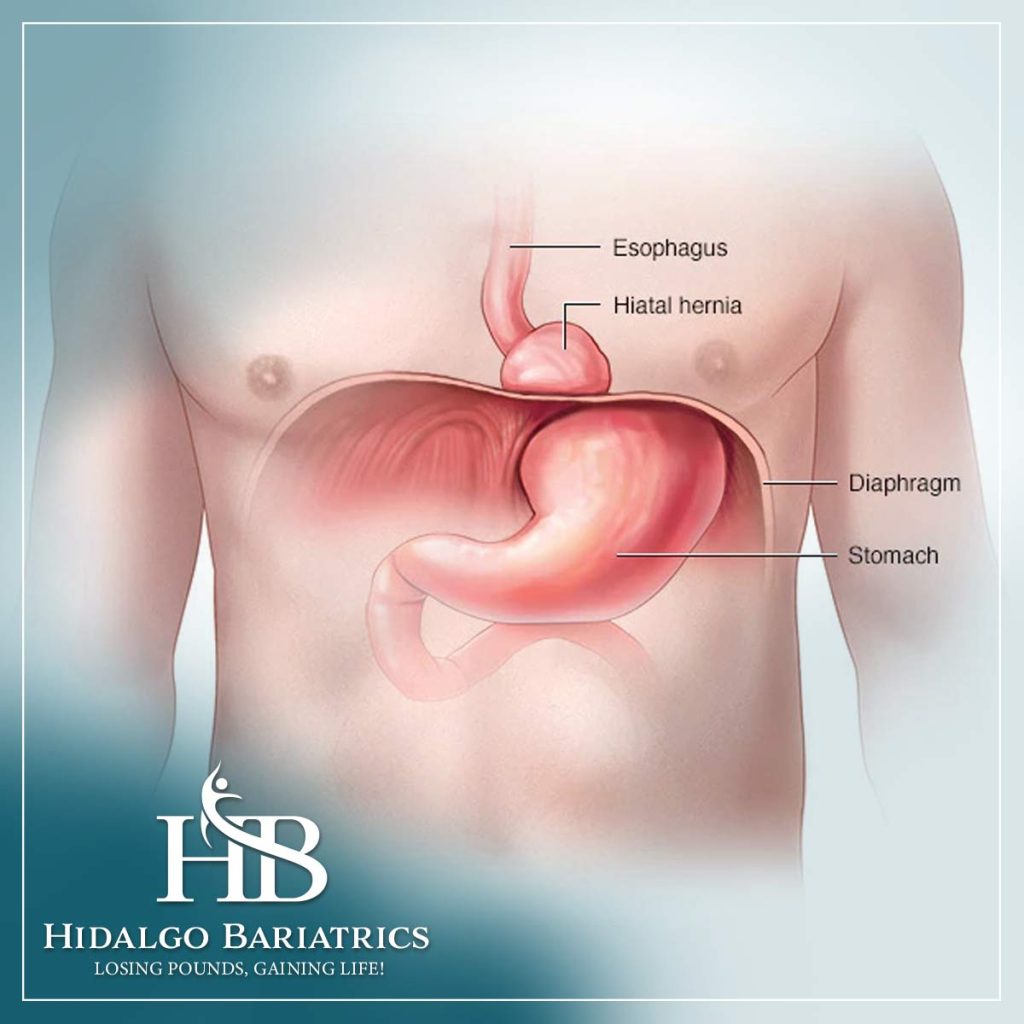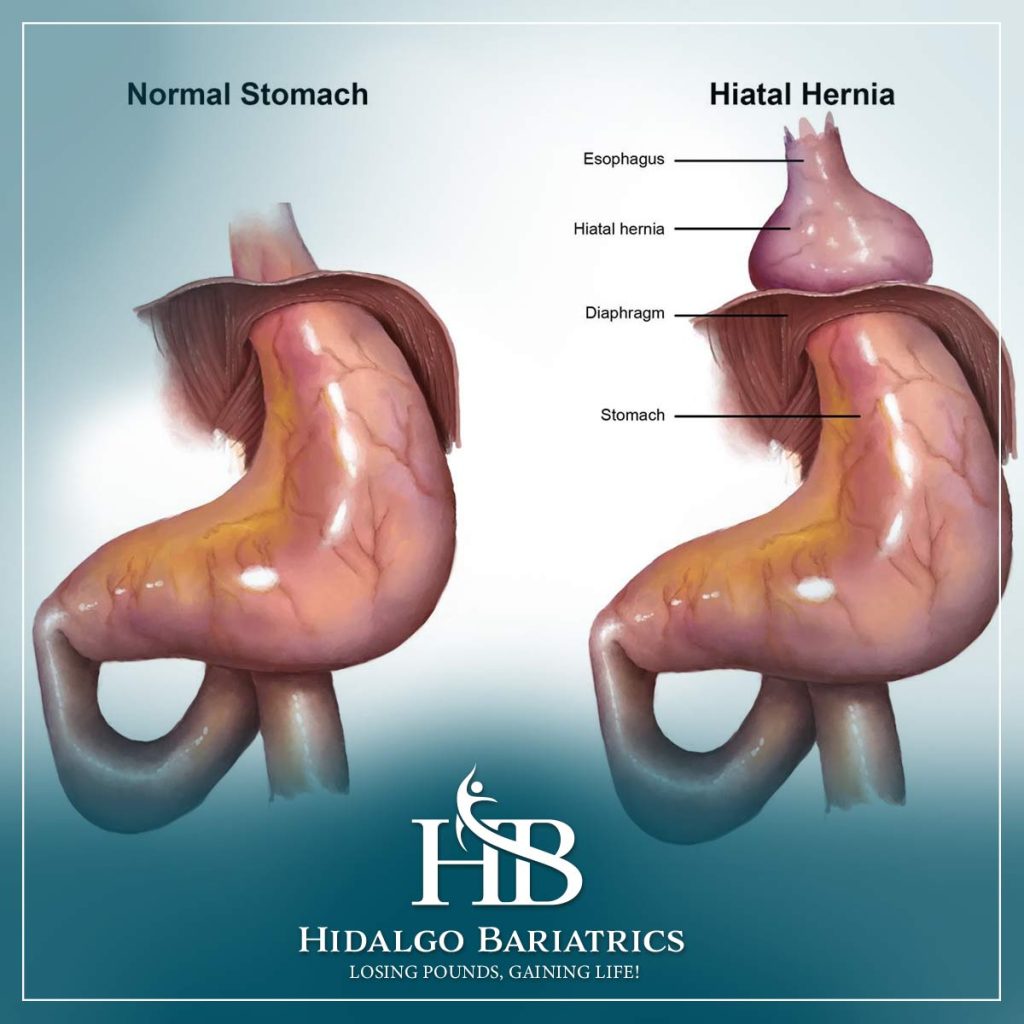Understanding Hiatal Hernia in Bariatric Patients
Importance, Treatment, and Benefits
In the realm of bariatric surgery, patients often encounter various challenges beyond just excessive weight. One such complication that can arise is a hiatal hernia. Understanding what a hiatal hernia is, its significance, and how to address it is crucial for ensuring optimal outcomes for bariatric patients.
What is a Hiatal Hernia?
A hiatal hernia occurs when the upper part of the stomach bulges through the diaphragm into the chest cavity. This can happen due to weakened muscles or an opening in the diaphragm, which normally helps keep the stomach in place below the diaphragm. In bariatric patients, hiatal hernias can be particularly prevalent due to factors such as increased abdominal pressure from excess weight and changes in anatomy post-weight loss surgery.
Importance of Fixing it:
Addressing a hiatal hernia in bariatric patients is paramount for several reasons:

- Alleviating Symptoms: This type of hernias can cause discomfort, including heartburn, acid reflux, chest pain, and difficulty swallowing. By repairing the hernia, patients can experience relief from these symptoms, leading to an improved quality of life.
2. Preventing Complications: Left untreated, hiatal hernias can lead to more severe complications such as esophagitis, Barrett’s esophagus, and even esophageal cancer. Fixing the hernia reduces the risk of these complications, promoting long-term health and well-being.
Enhancing Bariatric Surgery Outcomes: For patients undergoing bariatric surgery, addressing a hiatal hernia before or during the procedure can optimize surgical outcomes. It allows for better access to the stomach and ensures that the stomach remains in the correct position post-surgery, reducing the likelihood of complications.
How to Fix it:
There are several approaches to repairing the hernia, depending on its size, severity, and the patient’s overall health. Common methods include:
Laparoscopic Nissen Fundoplication: This minimally invasive procedure involves wrapping the upper part of the stomach around the lower esophagus to strengthen the valve between the esophagus and stomach, thereby preventing acid reflux and reducing the hernia.
Laparoscopic Hiatal Hernia Repair: Surgeons use small incisions and a camera (laparoscope) to repair the hernia and reinforce the diaphragm, restoring the stomach to its normal position.


Bariatric Surgery with Hiatal Hernia Repair: In some cases, hiatal hernia repair can be combined with bariatric surgery, such as gastric bypass or sleeve gastrectomy. This approach addresses both conditions simultaneously, streamlining the recovery process for patients.
Benefits of Repairing Hiatal Hernia:
Repairing the hernia offers numerous benefits for bariatric patients:
Symptom Relief: Patients experience relief from symptoms such as heartburn, acid reflux, and chest pain, improving their overall comfort and quality of life.
2. Reduced Risk of Complications: By addressing the hernia, patients lower their risk of developing complications such as esophagitis and Barrett’s esophagus, which can have serious implications for long-term health.
3. Improved Surgical Outcomes: Repairing the hernia before or during bariatric surgery can lead to smoother procedures and better post-operative recovery, ultimately enhancing the effectiveness of the weight loss surgery.
4. Long-Term Health Maintenance: By addressing underlying issues like hiatal hernias, patients can better maintain their weight loss goals and reduce the likelihood of weight regain over time, supporting their long-term health journey.
Hiatal Hernia in Bariatric Patients with Dr. Hidalgo
Hiatal hernias present unique challenges for bariatric patients, but with proper understanding and treatment, these challenges can be effectively managed. By recognizing the importance of addressing hiatal hernias, implementing appropriate treatment strategies, and understanding the benefits of repair, bariatric patients can achieve better outcomes and enjoy improved overall health and well-being.
During bariatric surgery performed by Dr. Hidalgo, if a hiatal hernia is detected, it will be promptly addressed to ensure the success of the procedure and the patient’s long-term well-being. Dr. Hidalgo follows a meticulous approach, prioritizing the comprehensive care of his patients. By removing or repairing hiatal hernias during bariatric surgery, he aims to optimize surgical outcomes and minimize the risk of post-operative complications. This proactive approach underscores Dr. Hidalgo’s commitment to delivering the highest standard of care, providing patients with the best possible foundation for their weight loss journey.
If you need support or have more questions about Hiatal Hernia, make sure to reach an expert, Hidalgo Bariatrics always look forward to help you to improve your health.
See if you Qualify for Bariatric Surgery
Everything begins here

